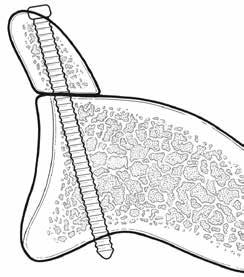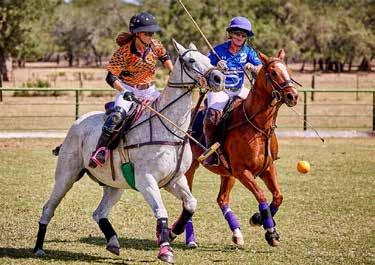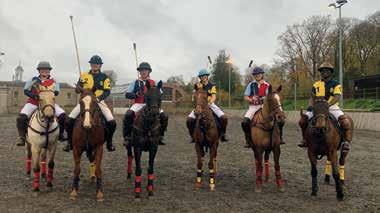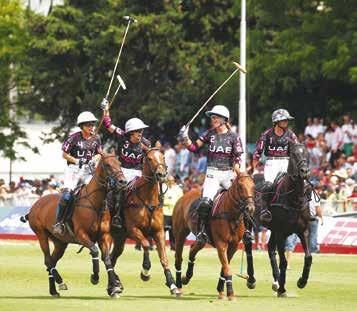
6 minute read
Performance Coach: Banish Blame to Win the Game
Understanding what it takes to overcome fear and self-doubt has been at the root of Paul ‘Stalkie’ Stalker’s personal transformation. He has proven experience of working with polo teams, Patrons and individual players for the past two years achieving outstanding results. With individual clients, Stalkie’s aim is to untap, nurture and focus their passion and potential on becoming the best versions of themselves in all aspects of their lives, whatever their starting point
Team engagement on and off the field is important for success
Advertisement
Banish Blame to Win the Game
Don’t let your mind interfere with your polo performance
If there’s one thing that has been fundamental to the continued success and growth of every polo team I have coached, it is the full engagement of the entire team, on and off the field.
This means creating a team culture in which everyone has the opportunity to develop and fulfil their potential, regardless of role, age, experience and handicap.
Yes, every team wants to win trophies, but let’s enjoy doing it – enthuse, feel good about ourselves and do the very best for each other.
So how do some polo teams manage to breed fear and insecurity in their players, draining them of their energy and power?
In a word, it’s BLAME. A blame culture compromises relationships, railroads performance and terrorises the joy of playing polo.
We can all recognise how blame manifests itself in polo: • The team argues with each other about poor play, giving away technicals, missed penalties, lost games • Players ignore their own shortcomings and instead moan about their horse, the weather, the state of the field, the umpire, the tactics, the training, the coach, the patron • The occasional patron or coach has been known to say things like ‘unless we start performing and winning, I’m going to have to make changes…’
I often find myself talking about the negative impact of a ‘self-serving bias’ with my polo clients. This occurs when a player is quick to take credit for themselves when things go well but lays blame on other players or circumstances when things don’t go so well.
Blaming someone or something for your problems is the ultimate cop out, the path of least resistance – it won’t fix anything! Worse still, psychological and human science studies point to all kinds of ongoing harm that a blame mentality can have upon our mental and physical health:
• Your power
According to Dr Martin Seligman, the father of positive psychology, if every bad thing is someone else’s fault, it contributes to a state of ‘learned helplessness’ which means you lose the power to change anything. If you’re in a polo rut, you’ll stay in it.
• Your personal growth
Blame is a defence. Constantly defending yourself shuts you down to what others can offer you in terms of advice, wisdom and growth. You’ll struggle to learn anything from other outstanding players and coaches.
• Your empathy
When you blame others instead of taking personal responsibility for your behaviour, you will never speak truthfully and openly about how you feel, and it means you are unlikely to listen and accept how others feel. You won’t seek to understand, or seek to be understood, by your team.
• Healthy relationships
Blame pushes people away from you and creates a trustless environment in which others can’t relax and speak their mind in fear of being judged and devalued. Peak polo performance relies upon trust.
• Your positive influence on yourself and your team
Blame is like a virus in polo. If you blame, others are likely to take part in the blame game too. Blamers are found to be more ego defensive and insecure. The more you blame, the less your sense of self-worth.
• Your health
Negative emotions such as blame lead to ‘biological dysregulation’. It stimulates cortisol, the body’s stress hormone, and adrenaline, the hormone that prepares your sympathetic nervous system to fight or flee.
An excess of these chemicals can lead to burnout, emotional exhaustion, aggravated depression, anxiety, phobias, shyness, loneliness – none of which improve a polo player’s ability to step up to the next level.
Mind the Gap and Banish Blame
Taking responsibility for our actions and responses can be very hard to do. It’s easy to blame others rather than look in the mirror and think “I am really the one to blame here”, or “why did I allow myself to become helpless when it counted most?”.
The good news is that polo players, like every other human being, are stimulusresponse beings: if you get some pepper up your nose, you sneeze. The pepper is a stimulus, the sneezing is a response over which you have very little conscious control.
However, you can exercise control over most stimuli if you choose to do so. There is a gap between the stimulus (i.e. what happens to you) and how you react to it.
In polo terms, when somebody disses how you are playing, or criticises your team or your horse, you can choose a response that serves you best. You can mind the gap, choose to allow your anger to develop, or choose to exercise patience. In every moment, this choice exists.
You can choose to take a moment to regain your peak state and visualize your shot before taking a penalty for example.
This is because what you focus on, you feel.
Taking the criticism personally means you are focusing on what you’re not doing right as opposed to focusing on what you are doing right. And whatever you choose to focus on, negative or positive, it will be validated by a marvellous part of your brain called the Reticular Activating System (aka the RAS).
The RAS starts above your spinal cord, it’s about two inches long, the width of a pencil, and it’s the magical gatekeeper between the subconscious and conscious parts of our brain.
This explains when you are thinking of buying a certain type and colour of car for example, your RAS will go and seek out similar cars and prompt you to keep spotting them in the street or on the road. Likewise, if you focus on how bad your polo form is, your RAS will recollect and remind you of all the bad games you have had.
Using my toolbox of polo coaching tips, I show my players, particularly the senior players, how to take responsibility for their behaviour and their actions. Then I coach them to pass this principle forward to less experienced players.
The outcome is that they will go into every game believing everything will happen in that game. But they will ride with it and focus on controlling the controllables. If you miss a penalty, it’s just a bad shot out the way. The good shots will come by focusing on your previous good shots – the ones that have been game-winners, the ones that have brought ecstasy and pride to you and your team.
To Play the Game Without Blame
• Understand how much of your power you are giving away and ask yourself what this behaviour is costing you now and will cost you in the future • Agree to welcome constructive criticism from yourself and others. The best version of your polo self is always under construction • Blaming your fellow polo players for your problems won’t solve anything. Denying your own shortcomings will deny you the opportunity to realise your polo potential • When your feelings such as confidence and self-respect are only associated with what others think of you, you’ll never be a truly authentic polo player • By choosing the right response to serve you in any given situation, nobody can control your focus other than yourself.
You will learn to control your life, your destiny and your polo.
For further info contact; Stalkie@rygp.co.uk or call him on +44(0)7771 515885 www.raisepolo.com
Join Stalkie’s Free Webinar: Raising Your Polo Game Stalkie will be sharing three of the top tips that have supported two of the teams he’s worked with this season, achieve new heights. Register by emailing polotimes@rygp.co.uk with your name, contact phone number and team name.












